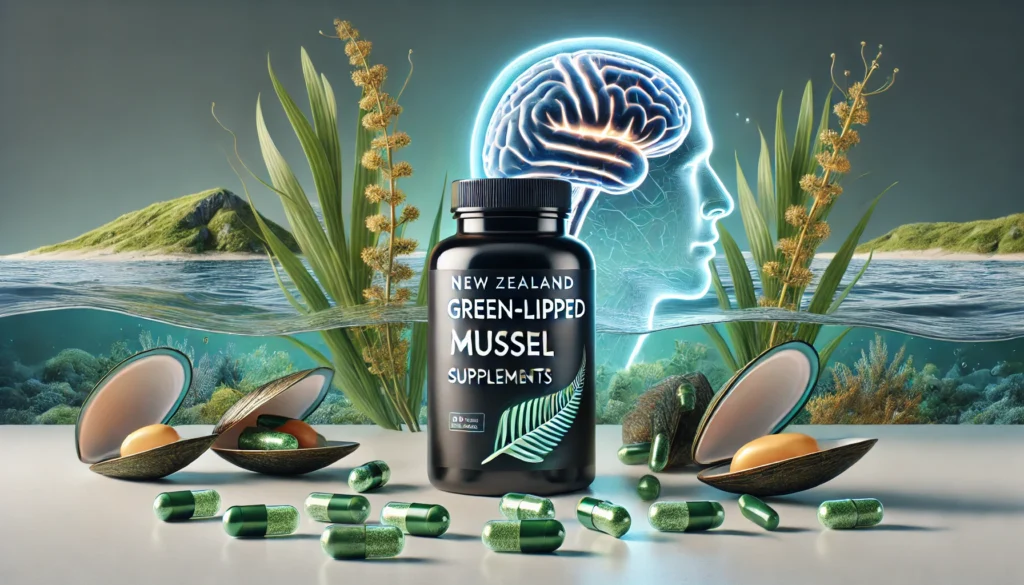New Zealand Green-Lipped Mussel (Perna canaliculus), often referred to as GLM, is a unique shellfish native to New Zealand’s coastal waters. It has gained international attention not only for its culinary value but also for its potential health benefits. Known for its rich nutrient profile, New Zealand Green-Lipped Mussel is used as a supplement for various purposes, including supporting joint health, reducing inflammation, and potentially enhancing cognitive function. This article explores the key aspects of New Zealand Green-Lipped Mussel as a supplement, detailing its sources, chemistry, physiological mechanisms, potential nootropic benefits, dosing, side effects, drug interactions, and safety considerations.
You May Also Like:
Piracetam: Benefits, Dosage, Side Effects, Drug Interactions, And Other Important Information
Modafinil: Benefits, Dosage, Side Effects, Drug Interactions, And Other Important Information
Sources of New Zealand Green-Lipped Mussel
Green-lipped mussels are cultivated along New Zealand’s pristine coastlines, where they feed on nutrient-rich plankton in cold, clear waters. This environment is thought to contribute to their distinctive nutrient profile, which includes omega-3 fatty acids, glycosaminoglycans, and unique bioactive compounds. As a supplement, GLM is available in various forms, including freeze-dried powders, capsules, and oils.
Primary Nutritional Components
New Zealand Green-Lipped Mussel is a source of:
- Omega-3 Fatty Acids: Known for their anti-inflammatory and brain-protective properties, these fatty acids include eicosapentaenoic acid (EPA) and docosahexaenoic acid (DHA).
- Glycosaminoglycans (GAGs): These compounds play a role in cartilage health and have anti-inflammatory properties that can benefit the joints and potentially cognitive functions.
- Antioxidants and Unique Proteins: GLM contains antioxidants such as carotenoids, which protect cells from oxidative damage and may contribute to neuroprotection.

Chemistry of New Zealand Green-Lipped Mussel
The bioactive compounds in New Zealand Green-Lipped Mussel contribute to its physiological effects. Notably:
- Omega-3 Fatty Acids: EPA and DHA in GLM support brain cell membrane health and reduce inflammation.
- Glycosaminoglycans: GAGs are essential for maintaining the structural integrity of cartilage and are involved in cellular communication, which can indirectly impact cognitive health.
- Marine-Specific Peptides: These peptides have anti-inflammatory effects and may support the brain’s immune environment, potentially protecting neurons from age-related decline.
Physiological Mechanisms of New Zealand Green-Lipped Mussel in the Body and Brain
The primary mechanisms of action of New Zealand Green-Lipped Mussel in the body and brain include anti-inflammatory, antioxidant, and neuroprotective effects, largely due to its fatty acid profile and unique protein structures.
- Anti-inflammatory Effects: GLM is widely recognized for its anti-inflammatory properties. This is largely attributed to its unique combination of omega-3 fatty acids, particularly EPA and DHA, which inhibit the production of pro-inflammatory cytokines and enzymes such as COX-1 and COX-2. Chronic inflammation is linked to neurodegenerative diseases; therefore, the anti-inflammatory effects of GLM may support cognitive health by reducing neural inflammation.
- Antioxidant Properties: The antioxidants in GLM, including carotenoids, counteract oxidative stress, which is a key contributor to cellular aging and cognitive decline. By neutralizing free radicals, GLM helps preserve the integrity of neurons and may protect against conditions like Alzheimer’s disease.
- Cellular Communication and Neuroprotection: The glycosaminoglycans in GLM support cellular signaling and communication, which are critical for brain functions such as memory, learning, and mood regulation. Additionally, these compounds support cell membrane integrity, which is crucial for effective neurotransmission.

Potential Nootropic Benefits of New Zealand Green-Lipped Mussel
The potential nootropic benefits of New Zealand Green-Lipped Mussel primarily derive from its capacity to support brain health through inflammation reduction, antioxidant activity, and cellular protection.
- Improved Cognitive Clarity and Memory: The omega-3 fatty acids in GLM enhance cell membrane fluidity and function, particularly in neurons, which rely on these fats for optimal performance. This boost to neuronal health and function promotes better cognitive clarity, improved memory, and potentially even long-term cognitive resilience.
- Reduced Neuroinflammation: Chronic neuroinflammation is a risk factor for neurodegenerative conditions and cognitive decline. By reducing inflammation in the brain, GLM may help preserve cognitive function, especially in individuals with mild cognitive impairment or other neurodegenerative risk factors.
- Mood Regulation and Stress Response: Preliminary evidence suggests that the fatty acids and unique peptides in GLM may positively influence mood and stress response. The fatty acids support neurotransmitter function, while the peptides may have a calming effect on the nervous system, potentially benefiting individuals with anxiety or mood disorders.
- Enhanced Focus and Attention: The unique combination of omega-3 fatty acids and glycosaminoglycans in GLM may support neurotransmitter function, which is critical for sustained focus and attention. By maintaining healthy neuronal cell membranes and supporting efficient signal transmission, GLM may improve cognitive endurance, helping individuals remain attentive for longer periods.
- Protection Against Age-Related Cognitive Decline: Antioxidants like carotenoids in GLM combat oxidative stress, a major contributor to age-related cellular damage. This oxidative protection may help slow age-related cognitive decline and support overall brain health into later life.

Dosage and Supplementation Guidelines
The optimal dosage of New Zealand Green-Lipped Mussel varies based on the purpose of supplementation, and it is essential to follow guidance from health professionals. Typical dosing recommendations include:
- General Health Support: For overall health benefits, a daily dose of 300-600 mg of freeze-dried GLM powder or 50-100 mg of GLM oil is often recommended. This dosage supports joint health and may have secondary cognitive benefits.
- Nootropic Support: For those specifically interested in cognitive enhancement, a higher dose of 800-1000 mg per day may be more effective, though further studies are needed to establish a precise dosage for cognitive benefits.
- Form and Absorption: GLM is available in powder and oil forms, with oil-based supplements generally offering better bioavailability. Taking GLM with food containing healthy fats may enhance absorption.
- Cycle Usage: Due to potential desensitization to omega-3s, some practitioners recommend cycling the supplement—using it for 4-8 weeks, followed by a 2-4 week break.
Side Effects and Safety
New Zealand Green-Lipped Mussel is generally considered safe for most individuals, though some may experience side effects, especially at higher doses. Common side effects may include:
- Gastrointestinal Distress: Mild symptoms such as nausea, gas, or stomach upset may occur, particularly when taking higher doses. Starting with a low dose and gradually increasing it can help minimize digestive issues.
- Allergic Reactions: Individuals with shellfish allergies should avoid GLM, as it may trigger allergic reactions ranging from mild rashes to severe anaphylaxis.
- Skin Sensitivity: Some users may experience skin rashes or other dermatological reactions. Reducing the dosage often mitigates these effects, but discontinuation may be necessary if symptoms persist.

Interactions with Other Supplements and Medications
Interactions between New Zealand Green-Lipped Mussel and other supplements or medications are not extensively studied, but there are some known considerations:
- Anti-inflammatory Medications: GLM’s anti-inflammatory effects may enhance the efficacy of nonsteroidal anti-inflammatory drugs (NSAIDs) but could also increase the risk of bleeding, particularly in individuals taking blood-thinning medications like warfarin.
- Omega-3 Supplements: Combining GLM with other omega-3 supplements, such as fish oil, may lead to an excessive intake of fatty acids, potentially causing digestive upset or bleeding issues. Those supplementing with both should consult a healthcare provider to balance dosages.
- Antidepressants: Although not directly studied, omega-3s can influence serotonin levels, potentially interacting with selective serotonin reuptake inhibitors (SSRIs) and other antidepressants. Consulting a healthcare provider before combining GLM with such medications is recommended.
- Nootropics: GLM generally pairs well with other nootropic supplements, such as bacopa or L-theanine, but users should monitor for any overstimulation, particularly if combining GLM with caffeine or stimulant-based nootropics.
- Iron and Copper Supplements: GLM contains small amounts of these minerals, so supplementation with additional iron or copper may result in excessive levels, potentially leading to digestive issues or other symptoms.
Risks for Individuals with Certain Health Conditions
Certain individuals should exercise caution when using GLM supplements, especially those with pre-existing health conditions:
- Shellfish Allergy: Individuals with a shellfish allergy should avoid GLM altogether to prevent allergic reactions.
- Blood Disorders: Due to its anti-inflammatory and blood-thinning properties, GLM should be used cautiously in individuals with bleeding disorders or those on blood-thinning medications.
- Liver Disease: While GLM has not been shown to exert significant hepatotoxicity, those with compromised liver function may experience altered metabolism of the supplement, necessitating lower doses and close monitoring.
- Pregnancy and Breastfeeding: Limited data are available on the safety of GLM during pregnancy or breastfeeding. Consulting a healthcare provider is recommended before using the supplement in these cases.
Conclusion: Should You Consider New Zealand Green-Lipped Mussel as a Nootropic?
New Zealand Green-Lipped Mussel presents a promising option for supporting cognitive function due to its rich profile of omega-3 fatty acids, glycosaminoglycans, and antioxidant compounds. While traditionally known for joint health, GLM’s ability to reduce inflammation, protect against oxidative stress, and support neurotransmitter function makes it an interesting candidate for cognitive support and mood enhancement. However, more research is needed to establish its specific efficacy as a nootropic supplement.
As with any supplement, it is essential to consult a healthcare provider before beginning GLM supplementation, particularly if you have pre-existing health conditions or are taking medications that may interact with it. New Zealand Green-Lipped Mussel is a unique and potent supplement that could offer cognitive benefits for some users, but thoughtful consideration of dosage, potential interactions, and individual health needs is essential.

References:
- Perna canaliculus (Green-Lipped Mussel): Bioactive Components and Therapeutic Evaluation for Chronic Health Conditions. Retrieved from: https://pubmed.ncbi.nlm.nih.gov/26462365/
- A review on green-lipped mussel, Perna canaliculus immunology: the drivers, virulence factors, advances, and applications. Retrieved from: https://www.tandfonline.com/doi/full/10.1080/00288330.2023.2269865
- Pain Controlling and Cytokine-regulating Effects of Lyprinol, a Lipid Extract of Perna Canaliculus, in a Rat Adjuvant-induced Arthritis Model. Retrieved from: https://pmc.ncbi.nlm.nih.gov/articles/PMC2686621/
Important Note: The information contained in this article is for general informational purposes only, and should not be construed as health or medical advice, nor is it intended to diagnose, prevent, treat, or cure any disease or health condition. Before embarking on any diet, fitness regimen, or program of nutritional supplementation, it is advisable to consult your healthcare professional in order to determine its safety and probable efficacy in terms of your individual state of health.
Regarding Nutritional Supplements Or Other Non-Prescription Health Products: If any nutritional supplements or other non-prescription health products are mentioned in the foregoing article, any claims or statements made about them have not been evaluated by the U.S. Food and Drug Administration, and such nutritional supplements or other health products are not intended to diagnose, treat, cure, or prevent any disease.


